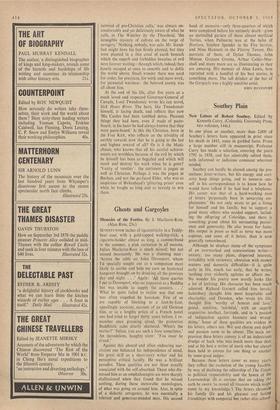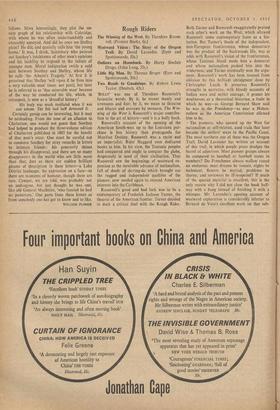Southey Plain
IN one place or another, more than 2,000 of Southey's letters have appeared in print since his death in 1843, some in garbled form. From a large number still in manuscript, Professor Curry has made a selection, covering the years 1792 to 1838, and has admirably edited them, with informed or judicious comment wherever needed.
Southey can hardly be classed among the pre- eminent letter-writers, but his energy and curi- osity keep things going, and to immerse one- self in his correspondence is to know how he would have talked if he had had a telephone. His career was that of a hard-working man of letters 'perpetually busy in unvarying em- ployments.' He not only wrote to get a living for himself and his family, but to support a good many others who needed support, includ- ing the offspring of Coleridge, and there is something grand about his unvaunting persist- ence and generosity. He also wrote for fame. His output in prose as well as verse was more copious, and some of it better, than is now generally remembered.
Although he displays many of the symptoms of an overworked and conscientious writer— anxiety, too many plans, dispersed interests, irritability with reviewers, obsession with money matters and domestic difficulties—it is quite early in life, much too early, that he writes, 'nothing ever violently agitates or affects me.' No wonder his poetry now mostly, looks like a lot of knitting. His character has been much admired. Richard Garnett called him heroic; Saintsbury thought him most hospitable and charitable; and Dowden, who wrote his life, thought him 'worthy of honour and love,' genial, sensitive, 'mirthful,' with an eagerly acquisitive intellect, fortitude, and in 'a passion of indignation against baseness and wrong- doing.' Some of these qualities are evident in his letters, others not. Wit and charm and depth and passion seem to be absent. The main im- pression these letters convey is of an industrious drudge or hack who 'was much more than that, and at his best a writer of merit who has always been held in esteem for one thing or another by some-good judges.
Because these letters cover so many years, they reflect the evolution of the young Jacobin, by way of declining the editorship of The Times, to political respectability and the haven of the Laureateship. (It is curious that on taking the oath he swore 'to reveal all treasons which might come to my knowledge.') The letters chronicle his family life and his pleasant and lasting friendships with congenial but rather dim school- fellows. More interestingly, they plot the un- easy graph of his relationship with Coleridge, with whom he was often understandably and excusably annoyed. And did he once see Shelley plain? He did, and quaintly calls him 'the young homo.' It was, I think, Saintsbury who pointed out Southey's intolerance of other men's opinions and his inability to respond to the talents of younger men. Moral indignation swirls a cold mist between Southey and Shelley, whose life he calls 'the Atheist's Tragedy.' At first it is perceived that Shelley 'will ripen if he lives into a very valuable man' (man, not poet), but later he is referred to as 'that miserable man' because of the way he conducted his life, which, in retrospect, is seen as a `dreadful history.' His body was much mutilated when it was cast ashore. The fish had hal{ devoured it. Certainly gossip can be interesting, but it may be misleading. From the tone of an allusion to Chatterton, one would not guess that Southey had helped to produce the three-volume edition of Chatterton published in 1803 for the benefit of that poet's sister. One must be careful not to condemn Southey for stray remarks in letters to intimate friends: his generosity shines through his disapproval, and there are so many disapprovers in the world who are little more than that. Just as there are sudden brilliant gleams of description in these letters—a Lake District landscape, the expression on a face—so there are moments of humour, though these are rare. Cowper, we are told, was probably not an androgyne, but just thought he was one, like old General Maclntire, 'who fancied he had no posteriors.' One parts from these letters as from somebody one has got to know and to like.
WILLIAM PLOMER







































 Previous page
Previous page